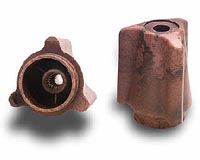Pour Yourself Some Wood

Two German scientists invented “liquid wood,” which has the potential to save significant fossil fuel and natural resources.
How about a renewable plastic that has wood-like qualities but can be cast by a machine? A group of scientists at the Fraunhofer Institute for Chemical Technology in Pfinztal near Karlsruhe invented just that in the late 1990s.
Source: German company sells ‘liquid wood’
On a quest for more sustainable products, Juergen Pfitzer and Helmut Naegele worked with Norbert Eisenreich, Wilhelm Eckl and Emilia Inone-Kauffmann. The scientists found that lignin, a key ingredient in every piece of wood, can be “transformed” into a renewable plastic if it’s mixed just the right way.
Lignin, combined with resins, flax and other natural fibers forms a mass that can be processed like any other thermoplastic material. The bio-plastic can be molded via injection machines, is durable and forms super-precise when it’s cast. The bioplastic was called Arboform (arbor is Latin for tree).
But what sets this “liquid wood” apart is its environmental potential: Arboform degrades like wood (into water, humus and carbon dioxide), so no more fume-emitting burning of plastics, and its inventors say no tree needs to be cut down to produce Arboform.
Lignin is a byproduct of the paper-making process. It is taken out of the cellulose to make the paper white and is usually burned. The paper and pulp industry is producing some 130 million pounds of lignin each year. “We knew right away that lignin, because so much of it is available as a byproduct, has a huge sustainability potential,” Pfitzer told UPI in a telephone interview.
The scientist claims that lignin could replace millions of barrels of oil used to make regular plastics. “By just using lignin, we could technically replace a quarter of the world’s plastic production,” Pfitzer said.
That potential in mind, the scientists in 1998 founded Tecnaro, a spinoff company to commercially develop Arboform. Based in the state of Baden-Wuerttemberg, Tecnaro started out with two employees. The firm has grown to 14 employees, resisted takeover offers from large chemical companies and, between 2005 and 2009, quintupled its sales. In 2010, Tecnaro is due to produce 275 tons of Arboform and several other biodegradable and renewable polymers it has developed over the past years.
Several products made of Arboform have been revealed, including baby toys, furniture, castings for watches, designer loudspeakers (Arboform has wood-like acoustic qualities), golf tees that degrade on the course and even coffins.
Italian shoe firm Sergio Rossi (part of Gucci Group) recently unveiled its “Eco-Pump”, an environmentally friendly women’s shoe with a sole and heel made of Arboform. The shoe was launched to accompany the “Home” film by Yann Arthus-Bertrand and Luc Besson. “It’s great to see that something fancy can be environmentally friendly,” Pfitzer told UPI.
Pfitzer admits that it has been very hard to penetrate the German plastics market, mainly because it takes so long to get a product approved. While Arboform can be artificially colored, the bioplastic won’t turn white or transparent.
But there are markets for which Arboform may be just right: Tecnaro is banking specifically on the automobile sector. The bio-plastic looks and feels like wood but lends much greater design possibilities.
“It’s possible to craft intricate interior design elements, for example small round knobs, in the same wood-like finish with Arboform, and that of course is very interesting to interior designers,” Pfitzer said.
Tecnaro has recently entered into a cooperation to develop Arboform-made interior materials with Daimler, Takata-Petri, Bosch and Fischer Automotive, Pfitzer told UPI.
As in every new product, pricing is key. While regular plastics cost between 70 cents and $3.20 per pound, the price for Arboform starts at $1.70 per pound. If the oil price continues to rise, then Arboform might even be cheaper one day. Its environmental price tag is already hard to beat.

Leave a Reply
Want to join the discussion?Feel free to contribute!